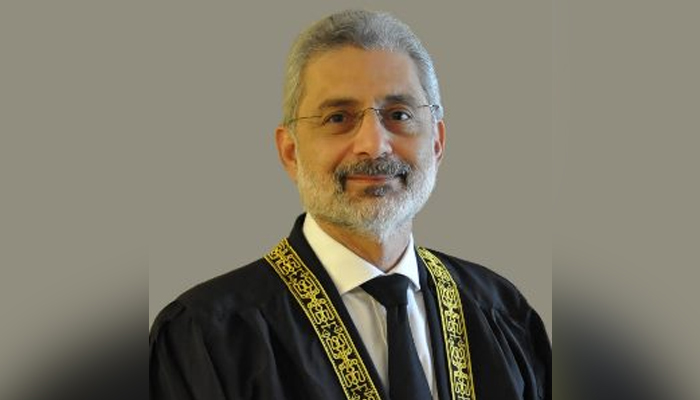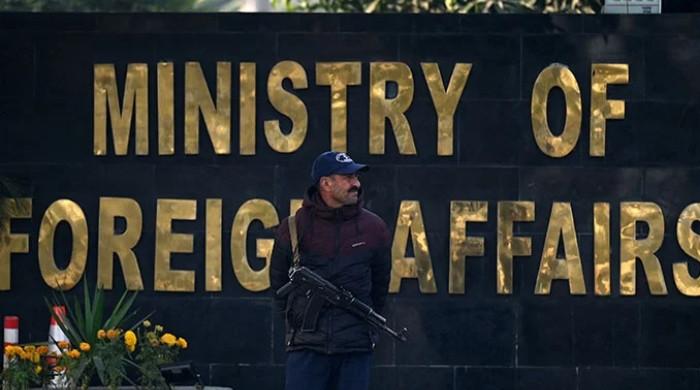Justice Isa refuses to hear cases after SC registrar suddenly reshuffles benches
"How will there be transparency if the registrar transfers a case from one bench to another?" questions Justice Isa
February 28, 2023

- We want transparency, says Justice Isa.
- SC summons registrar with all the records.
- Registrar says hearings scheduled after CJP's approval.
Casting doubts on the transparency of the case-assigning procedure, Supreme Court of Pakistan (SCP) judge Justice Qazi Faez Isa Tuesday refused to hear the scheduled cases after the registrar shook up the benches without keeping the concerned judges and other stakeholders in the loop.
The registrar reshuffled the benches today and replaced Justice Hasan Rizvi with another judge after which Justice Isa and Justice Yahya Afridi raised objections to the allocation of cases.
The judges questioned the procedure of assigning cases in the top court. During the hearing, the court also summoned the registrar of the Supreme Court along with all the records.
"I am a Supreme Court judge and have been the chief justice of Balochistan High Court for five years," said Justice Isa, adding that he wants transparency.
"How will there be transparency if the registrar transfers a case from one bench to another?" he questioned.
"It seems like the registrar has more power than a judge like me," he said, adding, "He cannot hear the cases from the year 2010 as the registrar appoints the judges by himself".
"Can I ask the registrar to appoint a specific case to a specific bench?" Justice Isa asked.
At this, the registrar said that the hearing of the cases is scheduled only after Chief Justice of Pakistan Umar Ata Bandial's approval.
"The bench included Justice Hasan Rizvi. Why did it change?" questioned Justice Afridi.
Amanullah, former president Supreme Court Bar Association (SCBA) said people had tired themselves out by asking but their cases were not fixed for hearing.
"What is the policy behind the allocation of cases?" Justice Isa asked the SC registrar.
He said that the court had ordered the registrar on April 2, 2022, to set the procedure for scheduling cases.
Justice Isa said there was no transparency in the case-assigning procedure at the registrar's office.
"Why were mine and Justice Yahya Afridi's benches changed?" he asked the registrar and argued that changing the benches without informing the stakeholders created suspicions in the minds of the people.
The registrar said that the chief justice's staff officer made a proposal regarding the reshuffling of benches on verbal instructions.
He added that the officer had said that the roster of the judges was to be changed on the chief justice's directives.
Justice Yahya Afridi asked the registrar how was the weekly roster changed. "Was this roster set by Chief Justice rather than you (registrar)?" Justice Afridi asked.
"The initial roster is sent to the Chief Justice after setting the benches," the registrar responded.
To this Justice Isa said, "think before you speak, people look to Supreme Court for justice".
"Present the file and the approval upon which the note was sent," Qazi Isa told the registrar. "Sir, there's no file, we send it on paper like this one," the registrar responded.
"You kill half the justice if you bring my brother's case forward for hearing on my behest by pushing the scheduled ones back," Justice Isa remarked.
"I am sorry to the petitioners and the lawyers, I will not be conducting the hearings today," said Justice Isa, adding that a reason was not given regarding the sudden change of benches.
"The sudden change in benches and the rescheduling of the cases cast doubts on the whole judicial process," he remarked.
He said that Article 10-A was about basic rights, "which say that a person shall be entitled to due process".
"There should be legal reasons to change a bench," he said, adding that the dignity of the judiciary would be affected if there was no transparency.
"The cases that were filed first should get precedence and be heard first," he added.









